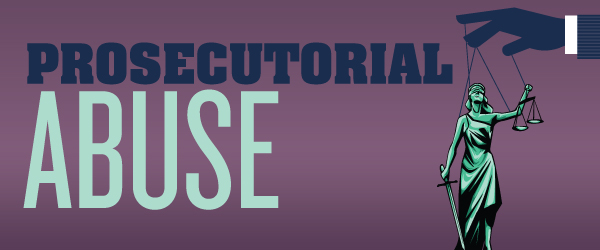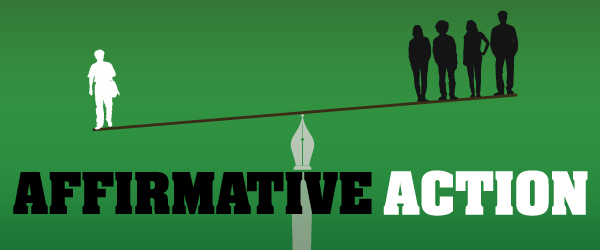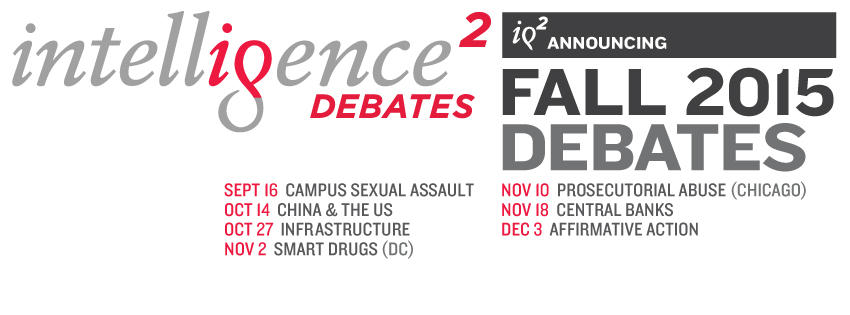I’m proud to announce the next exciting season of Intelligence Squared U.S. Debates, which launches this evening in New York City. Our series premieres tonight with a timely debate on sexual assault in America’s colleges. Everyone agrees that campus sexual assault needs to be addressed – but the question is, how? Tune in at 6:45 PM EDT and watch our live stream. Details for all of our upcoming debates can be found below, and don’t forget to cast your pre-debate vote online for all of our topics.

WEDNESDAY, SEPTEMBER 16TH, 2015:
Courts, Not Campuses, Should Decide Sexual Assault Cases
High-profile cases have recently put campus sexual assault in the spotlight. One question that has repeatedly come up: why are these cases being handled by campuses at all? Title IX requires that every school receiving federal aid must take concrete steps to deal with hostile environments and sexual assault. This leaves colleges and universities with the task of figuring out what policies and procedures to enforce. Proponents say that campus investigations serve a real need, forcing schools to respond to violence and protecting the interests of victims in ways that the criminal justice system may fail. Can schools provide due process for defendants and adequate justice for victims, or do these cases belong in the courts? Learn more

WEDNESDAY, OCTOBER 14, 2015:
China and The U.S. Are Long-Term Enemies
Is China’s ascendancy a threat to the U.S.? China’s rise as an economic and military power, coupled with its aggression in the South China Sea, have led some to call for a major rebalance of U.S. policy and strategy. Can China be trusted to act as a responsible global stakeholder? And will they be a long-term ally, or adversary? Learn more

TUESDAY, OCTOBER 27, 2015:
Raise The Federal Gas Tax To Fund Infrastructure
The Highway Trust Fund provides funding for road, bridge, and mass transit projects across the country – and it’s running out of money. Its revenue source, the federal gas tax, at 18.4 cents a gallon, has not been raised in over two decades. Congress has been kicking this can down the road for years. There are many arguments for a leaner fund, among them, the idea that scaling back the program would force government to prioritize projects and eliminate waste. But proponents of the tax say that it still plays a vital role in supporting infrastructure, and that perpetual shortfalls have led to construction delays and uncertainty. Should Congress raise the federal gas tax? Learn more

MONDAY, NOVEMBER 2, 2015:
College Students Should Be Allowed To Take Smart Drugs
If you could take a pill that would help you study and get better grades, would you? Off-label use of “smart drugs” – pharmaceuticals meant to treat disorders like ADHD, narcolepsy, and Alzheimer’s – are becoming increasingly popular among college students hoping to get ahead, by helping them to stay focused and alert for longer periods of time. But is this cheating? Should their use as cognitive enhancers be approved by the FDA, the medical community, and society at large? Do the benefits outweigh the risks? Learn more

TUESDAY, NOVEMBER 10, 2015:
U.S. Prosecutors Have Too Much Power
Autonomy and immunity endow prosecutors with immense power within the criminal justice system. They control who will be charged, the specifics of the charge, and what goes to trial. What’s more, defendants and defense attorneys are not permitted to be present during the grand jury process preceding and determining criminal indictments. Critics charge that there is an epidemic of prosecutorial misconduct, encouraged by an opacity and lack of accountability that threatens our legal system and democracy itself. But when the system works well, they are able to effectively prosecute crimes of great complexity. Is it time to rein in prosecutors? Learn more

WEDNESDAY, NOVEMBER 18, 2015:
Central Banks Can Print Prosperity
Central banks all around the world have been printing money. This policy, known as quantitative easing in banker jargon, has driven up the price of stocks and bonds. But will it lead to real and sustainable increases in global growth, or is it sowing the seeds of future inflation? Learn more

THURSDAY, DECEMBER 3, 2015:
The Equal Protection Clause Forbids Racial Preferences In State University Admissions
The Fourteenth Amendment to the U.S. Constitution provides that: “No State shall … deny to any person within its jurisdiction the equal protection of the laws.” Yet many state universities give substantial preferences to certain races in their admissions decisions. In Regents of the University of California v. Bakke (1978), the Supreme Court approved such preferences, but the case was close, and controversial, and the question will be back before the Supreme Court this term. One side may argue that these preferences level the playing field, remedy prior discrimination, and enhance diversity within the classroom, thus redeeming the true promise of equal protection. But the other may say that these preferences – in favor of some races, at the expense of others – are racial discrimination pure and simple, the precise evil that the Equal Protection Clause was intended to forbid. Learn more
Join us in person, during live debate streams, or on our celebrated podcast, available here.
Learn about all of these debate and more on the Intelligence Squared U.S. website: iq2us.org
–Robert Rosenkranz




